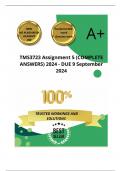,TMS3723 Assignment 5 (COMPLETE ANSWERS) 2024 -
DUE 9 September 2024 ; 100% TRUSTED Complete,
trusted solutions and explanations.
1. How can problem-based learning be used to encourage
students to think critically (10 marks) and creatively and to
develop their teamwork and communication skills (10 marks)?
(20) 2. How can context-based learning be effectively applied in
indigenous knowledge systems (IKS) situations to solve
complex problems (10 marks) and deal with challenges faced by
communities or organisations (10 marks)? (20)
1. How Problem-Based Learning (PBL) Encourages Critical
Thinking, Creativity, Teamwork, and Communication Skills
Encouraging Critical Thinking (10 Marks):
1. Engaging with Real-World Problems: PBL encourages
students to analyze and evaluate real-world problems that
do not have straightforward solutions. This process requires
them to apply critical thinking to assess different aspects of
the problem, identify underlying causes, and evaluate the
impact of various solutions.
2. Promoting Inquiry and Questioning: PBL environments
require students to ask questions, seek evidence, and
challenge assumptions. This fosters a mindset of inquiry,
where students critically evaluate the information presented
to them and consider multiple perspectives before reaching
a conclusion.
3. Encouraging Evidence-Based Reasoning: In PBL,
students must gather and assess evidence to support their
arguments. This process develops their ability to
, differentiate between reliable and unreliable sources, draw
logical conclusions, and justify their decisions based on
solid evidence.
4. Developing Problem-Solving Skills: Students in PBL
settings are often faced with complex scenarios that require
them to think critically about possible solutions, anticipate
consequences, and weigh the pros and cons of different
approaches. This iterative process strengthens their
problem-solving skills.
5. Facilitating Reflective Thinking: PBL encourages
students to reflect on their learning process, decisions
made, and the outcomes of their problem-solving efforts.
Reflective thinking allows students to evaluate their
performance and identify areas for improvement, fostering
a growth mindset.
Encouraging Creativity, Teamwork, and Communication
Skills (10 Marks):
1. Fostering Creative Problem-Solving: PBL allows
students the freedom to explore innovative and creative
solutions to complex problems. By not being confined to
one correct answer, students are encouraged to think
outside the box and consider unconventional approaches.
2. Enhancing Collaboration and Teamwork: PBL is
inherently collaborative, requiring students to work in
teams to solve problems. This collaboration helps students
learn to value diverse perspectives, leverage the strengths
of their peers, and negotiate different viewpoints to reach a
consensus.




